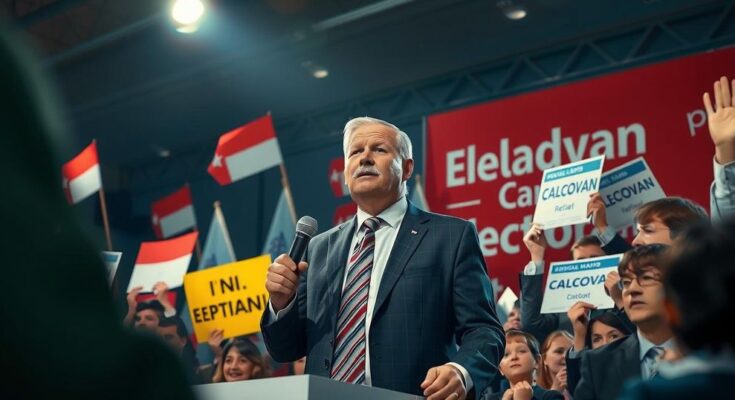Alexandr Stoianoglo, a pro-Russian candidate, has taken a narrow lead in Moldova’s presidential election against incumbent Maia Sandu. Allegations of substantial Russian interference have emerged, casting doubt over the electoral process. The election signifies a crucial decision for Moldova’s future alignment between the European Union and Russia. Preliminary results show votes at 50.5% for Stoianoglo and 49.5% for Sandu, with a 54% voter turnout.
The recent Moldovan presidential election run-off has revealed a narrow lead for Alexandr Stoianoglo, a candidate aligned with pro-Russian interests, in a pivotal contest opposing incumbent President Maia Sandu, who advocates for closer ties with the European Union. Preliminary results, with over 90% of votes counted, indicate Stoianoglo has secured 50.5% of the votes versus Sandu’s 49.5%. Throughout the election process, concerns over substantial interference from Russian sources emerged, with statements from Sandu’s national security adviser pointing to Russia’s significant role in potentially skewing the election results. Despite denials from the Kremlin regarding any electoral meddling, allegations were made that Russia arranged for organized transportation of voters to polling stations, highlighting a troubling trend of foreign influence in Moldova’s democratic processes. Additionally, reports surfaced of illegal voter transportation involving nationals from Russia, Belarus, Azerbaijan, and Turkey. Although the overall voter turnout reached 54%, a notable increase from previous elections, Stoianoglo demonstrated considerable support in rural areas while Sandu prevailed in urban centers. The outcome of this election is anticipated to have profound implications, particularly if Stoianoglo moves to realign Moldova’s foreign policy toward Moscow, given his backing from the pro-Russian Party of Socialists. The electoral tensions were further exacerbated by incidents of bomb threats that disrupted voting in several locations, alongside allegations of attempted vote buying by external actors, emphasizing the precarious nature of Moldova’s electoral integrity. Both candidates extended gratitude to voters after casting their ballots, emphasizing their respective visions for Moldova’s future in a world divided between East and West. The final results of the election will be officially confirmed later this week, although the race remains exceedingly close with ongoing scrutiny over the integrity of the election process. Should Stoianoglo achieve victory, it would signal a significant shift in Moldova’s geopolitical alignment and domestic policy direction, with long-lasting consequences for the region.
Moldova, a former Soviet republic located between Ukraine and Romania, has historically experienced a tug-of-war between pro-European and pro-Russian influences. The nation has been striving to solidify its place within the European Union while overcoming economic challenges. Recent escalations have highlighted Russian efforts to extend its influence, particularly in Eastern Europe, coinciding with a national sentiment favoring EU integration as embodied by President Maia Sandu’s administration. In light of these tensions, the recent presidential election has emerged as a vital referendum on Moldova’s foreign policy, amidst allegations of foreign interference and domestic power struggles.
The Moldovan presidential election stands as a critical juncture for the nation, illustrating the deep partisan divides and external pressures shaping its democratic landscape. The closely contested results between Alexandr Stoianoglo and Maia Sandu reflect the ongoing struggle between EU aspirations and Russian affinity. Both candidates have articulated their visions for Moldova, with outcomes that will likely redefine the country’s trajectory in the coming years. Vigilance over the integrity of the electoral process remains paramount as the final results are awaited amidst claims of foreign meddling and internal dissent.
Original Source: www.bbc.com




